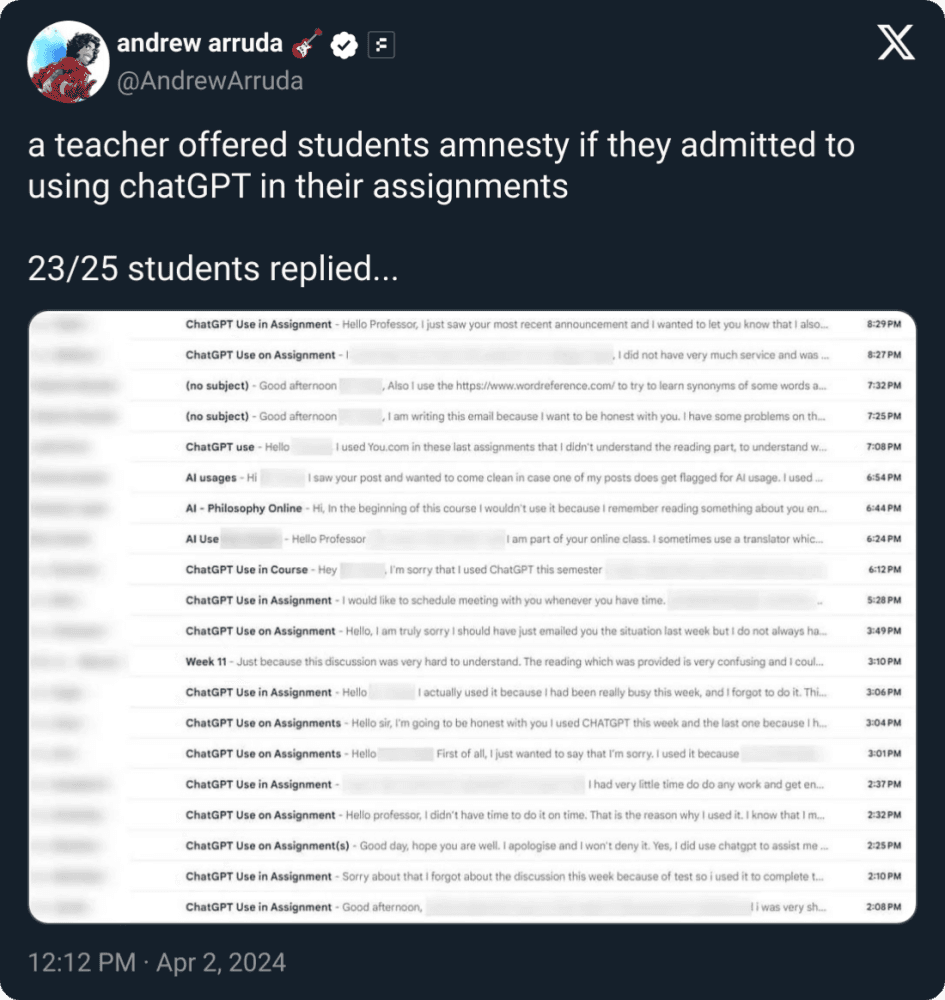
In 1985, Steve Jobs imagined computers enabling students to engage with the minds of history's greatest thinkers. Nearly 40 years later, his vision is all but fully realized.
While visiting Lunds University in Sweden, Steve Jobs gave a rather prophetic speech on the rise of computing technology in the education space. At a time when portable cassette players were considered cutting edge and the personal computing industry was looking particularly bleak, Jobs managed to succinctly lay out a vision for what wonders would come.
What is more impressive, even a bit eerie, is how relevant his perspective is as applied to today's artificial intelligence breakthroughs.
I can't ask Aristotle a question. I mean, I can, but I won't get an answer. And so my hope is that in our lifetimes, we can make a tool of a new kind, of an interactive kind.
Today, you can do just that. Don't believe me? Email aristotle@signaltheory.com your burning philosophical questions and see for yourself.
In this article, I will be breaking down this three minute clip and arguing that today's AI breakthroughs are not to be feared, but welcomed with sincere curiosity as we usher in a new era of human capability, creativity, and energy.
We're, as you know, living in the wake of the last revolution, which was a new source of free energy. And that was the free energy of petrochemicals. And it completely transformed society.
Jobs sets the scene by alluding to the many advances we have made in this post-revolutionary world. A world that was ushered in by the emergence of a new and seemingly boundless energy resource – hydrocarbons. We now know that these energy sources are anything but boundless, but one must recognize the ripple effects of this revolution have touched every corner of our world, leaving an indelible mark on our societies, economies, and cultures.
Importantly, this revolution has allowed humanity's focus to shift from the daily grind of manual labor and survival to the pursuit of higher goals and aspirations. The abundance of energy provided by hydrocarbons has freed us from the shackles of physical toil, allowing us to invest our time and resources into innovation, creativity, and progress. This is an outcome we see realized today through advances in computing, just as Jobs predicted.
We are now entering another revolution of free energy. Macintosh, as you know, uses less power than a few of those light bulbs, and yet can save us a few hours a day, or give us a whole new experience. And it's free intellectual energy. It's crude, very crude. But it's getting more refined year after year after year.
This is where things get a bit eerie. Jobs was right: at the time, this "free intellectual energy" was indeed very crude. But now, several decades later, it has been refined into pure, automated cognition. I'm reminded of this more recent discussion with Mustafa Suleyman, CEO of Microsoft AI as well as the co-founder and former head of applied AI at DeepMind, an AI company acquired by Google.
But I digress.
Jobs showed a bit more humanity in his daydreaming of the future.
My hope is someday, when the next Aristotle is alive, we can capture the underlying world view of that Aristotle in a computer. And someday, some student will be able to not only read the words Aristotle wrote, but ask Aristotle a question and get an answer.
Students today already know this is possible. So why are we fighting it?

I'm reminded of all the times I heard, "you won't have a calculator in your pocket everywhere you go" growing up. Today, we have the sum of all human knowledge at our fingertips – why are some institutions acting like that's a bad thing?
So this is a beginning. I think that, as you know right now, the computer industry is in the tank. Personal computers, big computers, everything. And it's difficult. It's a difficult time. But I'm sure that Henry Ford had a few bad quarters back in the 1920s.
It is all too easy to get in the trap of thinking, "if the technology isn't perfect today, it isn't worth pursuing." I see AI mocked every day in my position. And I get it – a lot of it is worth poking fun at. But make no mistake, the tidal wave is coming. We just have to zoom out a little bit.
I think that this year may be a delay. This year, we may look back and say, well, 1985 was a slow year. But there is such momentum behind this that it will happen.
No one thinks about 1985 being a slow year now. But what does your screen time look like this week? Steve Jobs also said in 2008, "These waves of technology, you can see them way before they happen, and you just have to choose wisely which ones you're going to surf." Not to be blunt, but if you are in a position to ride this wave or be buried by it, which are you going to choose?
It will happen within twenty years. It probably will happen within ten years. But it could happen within five years.
This last part of the video reminds me of something Bill Gates said: "Most people overestimate what they can do in one year and underestimate what they can do in ten years." While I believe this is true of organizations too, it certainly is true for the individual now more than ever.
There is a lot of static in the AI space right now. Between the hype grifters and the skeptics, organizations and institutions will soon face tough decisions in a noisy environment full of conflicting information. I would advise zooming out a bit and imagining what the world might look like in 2064.
Do you think this technology is going to get better or worse?
© Elijah Kleinsmith • All Rights Reserved